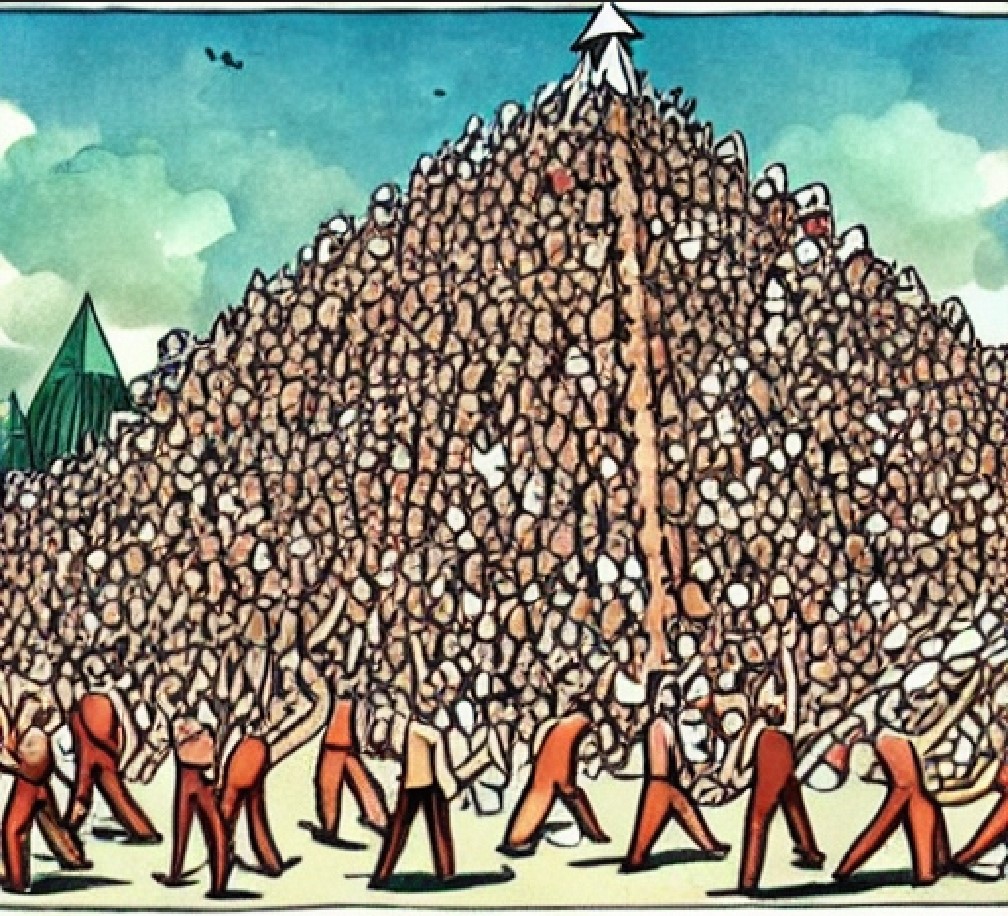The satisfaction economy aims to create a new economic paradigm that prioritizes personal satisfaction and wellbeing over material possessions and economic growth.
The tragedy of the commons is a concept that highlights the conflict between individual and collective rationality. It occurs when each individual is incentivized to act in a way that will ultimately be harmful to all. It can be applied to economic, political, social, and ecological contexts and suggests that the majority is always wrong.

In an economic context, the tragedy of the commons refers to the situation where individuals, acting in their own self-interest, exploit a shared resource, ultimately leading to its depletion or degradation. Examples of this include overfishing and overgrazing, overconsumption and wastage, deforestation and pollution, and even traffic congestion.
The satisfaction economy addresses the issue of the tragedy of the commons by prioritizing the satisfaction of basic needs and the wellbeing of the community over individual profit. It ensures that resources are used in a sustainable and equitable way, while also meeting the needs of the most vulnerable members of society. This helps prevent overuse and depletion of shared resources, which is the root cause of the tragedy of the commons.
The satisfaction economy potentially helps mitigate the tragedy of the commons not only by promoting a more equitable distribution of resources, but also incentivizing individuals to act in ways that benefit the collective good. By prioritizing the satisfaction of the most-in-need, the satisfaction economy helps ensure that resources are used in a sustainable and responsible manner, rather than being exploited for individual gain at the expense of the community. Additionally, the use of a satisfaction-based currency helps incentivize individuals to prioritize their actions based on their impact on overall satisfaction, rather than solely on their personal gain.
It goes beyond the concept of resources though, in contexts where group decisions are based on fear, selfishness, or greed, rather than on critical thinking the tragedy of the commons pervades politics, business, and society. Here are a few pertinent examples:
- Selection of governments in a democracy: In many cases, voters are tempted to vote for politicians or political parties that promise immediate benefits or short-term gains, even if these policies may be detrimental in the long run. This results in a “race to the bottom”, where politicians try to outdo each other in making unrealistic promises or implementing populist policies that may ultimately harm the common good.
- Political influence on uneducated masses in developing and underdeveloped countries: In many cases, political leaders in these countries have taken advantage of the lack of education among their citizens to maintain power and control over resources. They often make promises they cannot keep, misrepresent facts, or even use fear tactics to sway uneducated voters in their favour. This leads to the election of leaders who do not have the best interests of the people in mind, and who use their power to further their own personal or political goals, rather than improving the lives of their citizens.
- Voter apathy and low turnout: When individuals feel like their vote doesn’t matter or that their voice won’t be heard, they do bother to vote at all. This leads to a situation where the overall will of the people is not accurately represented, and those who do turn out to vote do necessarily represent the broader population.
- The spread of fake news and misinformation: On social media platforms, such as, Twitter and Facebook, such posts have negative impacts on society as a whole, even if individual users benefit from the attention their posts receive.
- Overuse and misuse of antibiotics: This has led to the development of antibiotic-resistant strains of bacteria, creating a collective problem that affects everyone who needs antibiotics to treat infections.
- Individual Hoarding: This is when resources are scarce and limited, and some individuals hoard resources for their own personal gain, causing a shortage for others. This happens in situations such as natural disasters, where essential resources like food, water, and medical supplies are limited, but some people hoard them, leaving others without access to what they need to survive. Or, during the pandemic, hoarding caused unnecessary shortages and delays.
- Economics-based hoarding: This occurs in economic systems where resources are allocated based on market demand and competition, but some individuals or corporations hoard resources to drive up prices and limit supply, creating scarcity for others.
The satisfaction economy is a model that seeks to address the tragedy of the commons by focusing on maximizing satisfaction rather than maximizing profit or consumption. In the political sphere, it promotes the common good rather than the interests of a select few. In the business world, it encourages businesses to prioritize the satisfaction of their stakeholders, including employees, customers, and the environment, over short-term profits. In social contexts, it promotes the well-being of individuals and communities through measures such as equitable access to resources and services.
By focusing on maximizing satisfaction, the satisfaction economy seeks to prevent the depletion of resources and ensure that everyone has access to what they need to live fulfilling lives. This helps to address the tragedy of the commons by promoting sustainable development, reducing inequality, and promoting social and environmental justice. For example, in the case of uneducated masses in developing and underdeveloped countries, the satisfaction economy would promote education as a means to empower individuals and help them access the resources they need to thrive.
Principally, the satisfaction economy is a model that seeks to address the tragedy of the commons by prioritizing the wellbeing of individuals and communities over the interests of a select few, and promoting sustainable development and social justice through individual and collaborative effort.

Whether the satisfaction economy completely reverses the tragedy of the commons, is difficult to say with certainty though, as the success of such an economic system would depend on a variety of factors and its effectiveness would vary based on the specific context in which it is implemented.
The satisfaction economy model also potentially addresses other relevant issues beyond the tragedy of the commons. Here are a few examples:
- Resource depletion: The satisfaction economy incentivizes conservation and responsible use of resources by valuing sustainability and long-term wellbeing over short-term gains.
- Income inequality: By prioritizing the satisfaction of basic needs and ensuring that everyone has access to the resources they need to thrive, the satisfaction economy helps reduce income inequality.
- Environmental degradation: The satisfaction economy encourages individuals and organizations to take responsibility for the environmental impact of their actions and products by valuing sustainability and minimizing harm to ecosystems.
- Health and wellbeing: The satisfaction economy prioritizes the satisfaction of basic needs, including access to healthcare, nutritious food, and safe living conditions, to promote health and wellbeing for all individuals.
- Education and knowledge sharing: The satisfaction economy prioritizes the sharing of knowledge and information to promote education and lifelong learning, leading to a more informed and engaged population.
Apart from addressing these pertinent issues, the satisfaction economy has implications for various fields of study as well, including:
- Economics: The satisfaction economy challenges the traditional economic focus on GDP growth and instead prioritizes the wellbeing of individuals and communities. It could lead to the development of new economic models and indicators that measure quality of life and human satisfaction rather than just material wealth.
- Psychology: The satisfaction economy emphasizes the importance of meeting human needs for autonomy, competence, and relatedness. This aligns with research in positive psychology and self-determination theory, which suggests that these needs are crucial for human flourishing.
- Sociology: The satisfaction economy recognizes that human beings are social creatures and that our wellbeing is closely tied to the quality of our social connections. This could lead to greater attention to social factors in understanding and addressing societal problems.
- Environmental science: The satisfaction economy recognizes the interconnectedness of human wellbeing and the natural environment. It could lead to greater attention to environmental sustainability and the development of new technologies and practices that promote both human satisfaction and environmental health.
- Political science: The satisfaction economy challenges traditional assumptions about the role of government and markets in promoting human wellbeing. It could lead to new models of governance and decision-making that prioritize the satisfaction of individual and community needs over the interests of powerful elites.
- Public health: The focus on wellbeing and satisfaction would lead to better health outcomes, as people’s basic needs would be met and they would have access to resources and education that promote healthy living.
The satisfaction economy has the potential to transform these, and other fields and areas of society, by prioritizing human needs and desires and promoting the common good over profit and growth.
Eventually, whether the satisfaction economy successfully reverses the tragedy of the commons and other issues, and how it transforms various fields and areas of society, would depend on factors such as, its implementation, the cultural and social context in which it is used, and the willingness of individuals and groups to adopt and support such a system.
To find out more, visit the events and resources page for Satisfaction Economy.

